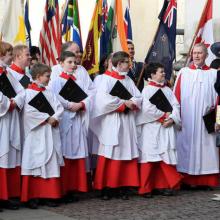evangelical Christian
May grew up in southeast England, the daughter of a Church of England vicar at a time when much of the nation was, by default, Anglican. In the 1950s and ’60s, the majority of people were married, baptized, and had their funerals in the Church of England, the established church. It was also a time when, despite the nation’s Christianity, few spoke about their faith, or about that of politicians.
President Donald Trump vowed to make good on a campaign promise to repeal the law that restricts political speech from the pulpit, speaking at his first National Prayer Breakfast as president.
“I will get rid of, totally destroy, the Johnson Amendment, and allow representatives of faith to speak freely and without fear,” he said on Feb. 2 to a gathering of 3,500 faith leaders, politicians, and other dignitaries from around the world, including King Abdullah of Jordan.
Religion reporting doesn’t usually put a journalist in harm’s way. We spend much of our time in church pews and at interfaith singalongs. But a few days earlier, Religion News Service had been offered a chance to go with Samaritan’s Purse relief workers as they distributed aid in Haiti to victims of Hurricane Matthew.
The Atlantic reports:
Ever since Ronald Reagan was elected president in 1980, evangelicals have been a powerful political force. Jerry Falwell and his Moral Majority organization were credited in part with Reagan's election, having registered millions of evangelicals to vote. Their influence would only grow over the next 25 years: Evangelicals were instrumental in Reagan's reelection, the Republican Revolution of 1994, and both of George W. Bush's victories. But on November 6, 2012, their reign came to an end.
"I think this [election] was an evangelical disaster," Albert Mohler, president of Southern Baptist Theological Seminary, told NPR. He's right, but it wasn't for lack of trying.
The late Falwell's Liberty University gave former governor Mitt Romney its keynote spot at its 2012 commencement and backed off previous language calling Mormonism a "cult." Billy Graham uncharacteristically threw his support behind the Republican candidate, and his evangelistic association bought full-page newspaper ads all but endorsing Romney. Ralph Reed's Faith and Freedom Coalition spent tens of millions in battleground states to get out the religious vote.
Read more here.
There are a lot of heinously unmerited personal attacks going on in these United States right now, but for some reason I’m most bothered by the ones against Dr. Katharine Hayhoe, a climate scientist and evangelical Christian. As this current Sojourners action alert describes, she’s been targeted by Rush Limbaugh, among others, for her efforts to speak the truth about global warming.
Partly, these attacks get under my skin because I’ve always had a soft spot in my heart for evangelical scientists. My dad is one, and my Intervarsity-linked Bible study in grad school was so full of them that, as often the lone humanities student, I jokingly made up a scientific discipline to fit in (“I’m in immunostatistics — I model atypical populations.”)
But mostly, the attacks on Hayhoe sadden me because she’s so genuine and earnest in her desire not just to convey the evidence for climate change, but also to engage in respectful dialogue.





